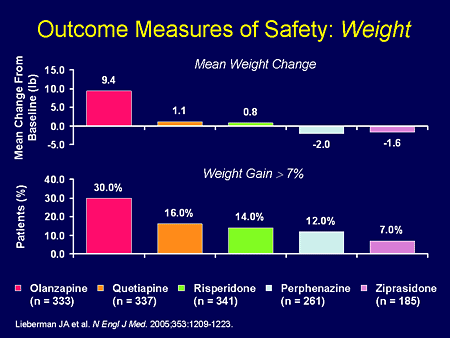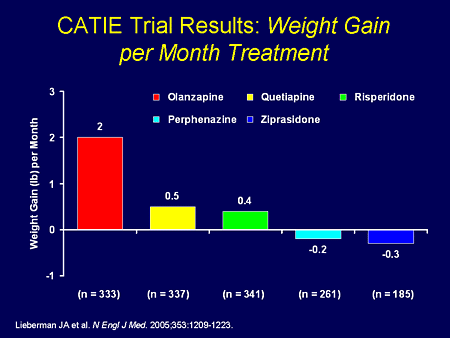Scientists have some ideas about why certain meds encourage weight gain, though they have highlighted a few factors they point to (metabolism changes, increased appetite, food 'cravings', etc).
HERE* are a few good slides from the CATIE study that talk about metabolism and weight gain in regard to some popular anti-psychotics. The gist of the findings is that Zyprexa/Olanzapine patients in the study gained more weight on average compared to other meds tested. The slides and explanation can be wordy, but I thought the graphs were pretty good at showing there were some differences in the findings. You can google the full CATIE study or the synopsis if you are interested in why/what they were studying. Just be careful generalizing their findings, because there are a lot of variables that can effect what they found when applying to an individual.
-edit-
*I just realized you'll need a Medscape (free) login to view the full article & slides. I copied two slides and one description below, though the full explanation is available through the link. 
Looking at changes in weight, we can again now graphically depict what you saw in some numeric tables from Dr. Lieberman. We can look at mean change in baseline weight on the top panel -- and this is last observation carried forward -- with about 9 pounds. This is very similar to what's been shown in other studies: a 9-pound gain on olanzapine; less gain on quetiapine and risperidone (somewhere around 1 pound). But here you see an interesting phenomenon; you're actually seeing weight loss in some of the treatment arms on the perphenazine and ziprasidone arm, and I don't think anyone's properly concluding from CATIE that ziprasidone or perphenazine is a weight loss drug. It's more a question of what were these individuals taking before, and if they've now switched or been randomized to something that has less drive on appetite, or curb on satiety, that you may actually see drops in weight.
On the bottom panel, you see the number of patients who achieve this criteria of a greater than or equal to 7% increase in body weight. This is a metric that the Food and Drug Administration uses and is typically included in the US package insert. You see very consistent with US package insert numbers; about 30% of patients taking olanzapine achieve this criteria for weight gain; about 16% on quetiapine; 14% on risperidone; 12% on perphenazine, and 7% on ziprasidone. Notice ziprasidone with 7% of the patients achieving a greater than or equal to 7% increase in body weight. Ziprasidone can be understood to cause some degree of weight gain, but it's in this top panel that you see the mean change was still in the negative direction.

Zyprexa can be a very effective med, though there will always be trade-offs. Many anti-psychotics can cause weight gain, so it can be a 'grass is always greener' scenario sometimes. Some may be less likely (Abilify for example), but in the end it depends on the person. Your psychiatrist is the best person to address side effect concerns and effectiveness of medications. There are some anti-psychotic meds that have less weight gain issues (on average), though there are other/different downsides to them. There are some things that can help with the side effects, though they can be different for each person: nutrition changes, additional med to address certain side effects, etc.
Best of luck.